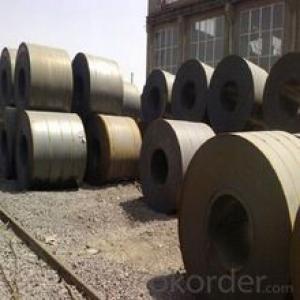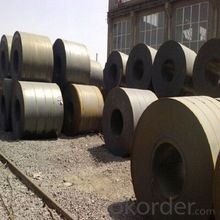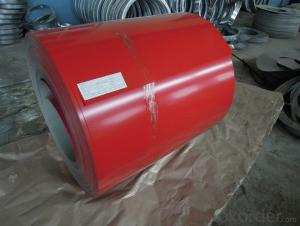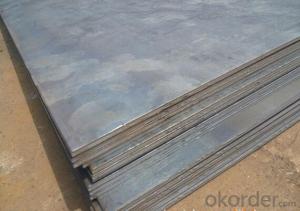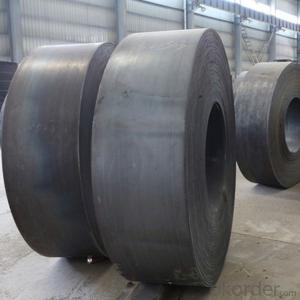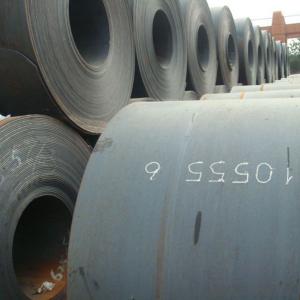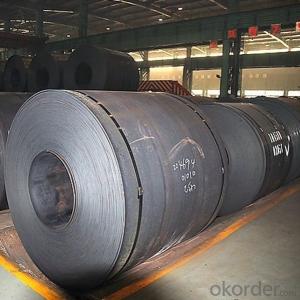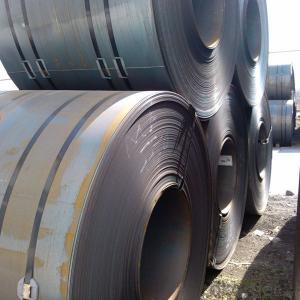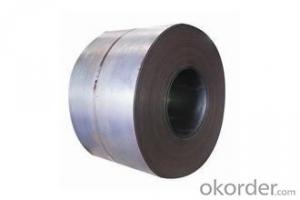SS400 Hot rolled steel coils
- Loading Port:
- China Main Port
- Payment Terms:
- TT or LC
- Min Order Qty:
- -
- Supply Capability:
- 50000 m.t./month
OKorder Service Pledge
OKorder Financial Service
You Might Also Like
Production Discription:
OKorder is offering high quality SS400 Hot Rolled Steel Coil at great prices with worldwide shipping. Our supplier is a world-class manufacturer of steel and steel coil and our products are utilized the world over, with OKorder annually supplying a full range of products to European, North American and Asian markets. We provide quotations within 24 hours of receiving an inquiry and guarantee a competitive price.
Product Applications:
SS400 Hot Rolled Steel Coil is used in a wide range of applications from structural, pressure vessel quality, pipe & tube, transportation (ship, barge, rail and automotive) and energy applications.
Product Advantages:
SS400 Hot Rolled Steel Coil resists corrosion and stains, is very low maintenance and its familiar luster make it an ideal material for many applications.
Main Product Features:
Resists corrosion
Low maintenance
Most dimensions available
Product Specifications:
Standard: AISI, ASTM, BS, DIN, GB, JIS
Grade: Q195, Q235, SS400, Q345, SPHC
Thickness: 1.5mm – 600mm
Width: 1250mm, 1500mm, 1800mm, 2000mm
Origin: China (PRC)
Model Number: 1.2 – 12.5
Type: Steel Coil
Technique: Hot Rolled
Surface Treatment: Other
Application: Boiler Plate
Special Use: High-strength Steel Plate
Delivery: 30 Days
FAQ:
Q1: Why buy Materials & Equipment from OKorder.com?
A1: All products offered by OKorder.com are carefully selected from China's most reliable manufacturing enterprises. Through its ISO certifications, OKorder.com adheres to the highest standards and a commitment to supply chain safety and customer satisfaction.
Q2: How do we guarantee the quality of our products?
A2: We have established an advanced quality management system which conducts strict quality tests at every step, from raw materials to the final product. At the same time, we provide extensive follow-up service assurances as required.
- Q: How are steel coils used in the manufacturing of industrial filters?
- Steel coils are used in the manufacturing of industrial filters to create the framework or structure that holds the filter media in place. The steel coils are shaped and welded together to form the desired size and shape of the filter, providing stability and durability to the final product.
- Q: The guy at this one pawn shop told me that stainless steel is better because it is just as strong and will not rust. The guy at the other pawn shop said that you need high carbon steel for a good sword because stainless steel breaks easily and that damascis is the best kind of steel for swords.
- You are gonna want carbon steel. Most real swords are always made from carbon steel. The vast majority of cheap swords being sold online are made from stainless steel. While stainless steel is a great choice for knives, it starts becoming very brittle on anything longer than 12? and is NOT a suitable material for a functional sword, no matter what some marketers might claim?. Stainless steel when it comes to a functioning weapon, is a joke. It's not made to cut and it's not made to last.
- Q: why does steel have a density range when other metals do not?
- Steel is not a pure element it is an alloy. Steel is primarily iron but it has many elements blended in that change it's density including carbon,silicon, nickel, chrome, etc. Aluminum and copper , magnesium and so forth can be the pure element or they can be alloys too. If they are alloys, then their densities vary also
- Q: What are the different methods of coil blanking for irregular shapes?
- There are various methods of coil blanking for irregular shapes, including laser cutting, waterjet cutting, and die cutting. Laser cutting involves using a high-powered laser beam to cut through the coil material, providing precise and intricate cuts. Waterjet cutting uses a high-pressure stream of water mixed with abrasive material to cut through the coil, offering flexibility and accuracy. Die cutting utilizes a custom-made die to stamp out the desired shape from the coil material, ensuring uniformity and efficiency. Each method has its own advantages and suitability depending on the specific requirements of the irregular shape being blanked.
- Q: How are steel coils used in the production of agricultural irrigation systems?
- Steel coils are used in the production of agricultural irrigation systems to create the pipes and tubing that transport water to crops. These coils are formed into various designs to meet specific irrigation needs, ensuring efficient and reliable water distribution for optimal crop growth.
- Q: How do steel coils contribute to thermal insulation in buildings?
- Steel coils do not directly contribute to thermal insulation in buildings. Steel coils are used in the construction of various building components, such as walls, roofs, and floors. However, these components need to be insulated separately using materials like foam, fiberglass, or mineral wool to provide thermal insulation.
- Q: How do you prevent damage to steel coils during transportation?
- To prevent damage during the transportation of steel coils, there are several measures that can be taken: 1. Tight and secure packaging: It is important to pack the steel coils tightly and securely to prevent any movement or shifting during transportation. This can be achieved by using appropriate packaging materials such as steel cradles, wooden dunnage, or steel straps to hold the coils in place. 2. Use cushioning materials: Adding cushioning materials like foam padding, cardboard, or bubble wrap between the coils can help absorb shocks and vibrations during transit. This additional layer of protection minimizes the risk of scratches, dents, or other damages caused by contact with other objects or surfaces. 3. Handle and load properly: It is crucial to use proper lifting equipment and techniques to avoid mishandling and dropping of the steel coils. Carefully lifting and loading the coils onto transportation vehicles using forklifts or cranes is recommended. Additionally, stacking the coils in a way that distributes weight evenly helps maintain stability. 4. Protect from weather: Steel coils are susceptible to corrosion, so it is essential to shield them from moisture and adverse weather conditions during transportation. Covering the coils with waterproof and weather-resistant tarps or shrink wrap prevents water or moisture from reaching the steel surfaces. 5. Regular inspections: Conducting regular inspections before, during, and after transportation is vital to identify any potential damage or issues. This allows for timely intervention to rectify any problems and prevent further damage. 6. Trained personnel: It is crucial to ensure that personnel involved in handling, loading, and transporting the steel coils are properly trained. They should be knowledgeable about the correct procedures and techniques to safely handle and transport the coils, reducing the risk of damage. By implementing these preventive measures, the likelihood of damage to steel coils during transportation can be significantly reduced, ensuring that the coils reach their destination in optimal condition.
- Q: What is the difference between a steel strip and a coil? The steel strip is flat steel, and the steel coil is made of steel. Is that correct?
- Steel rolls are also called steel belts. There is no difference between them. They are not flat steel
- Q: How are steel coils used in the production of HVAC equipment?
- Steel coils are used in the production of HVAC equipment as they serve as the primary components for heat transfer. These coils are responsible for facilitating the transfer of heat between the air and refrigerant, ensuring efficient cooling or heating of the air circulating within the HVAC system.
- Q: I am making a permanent magnet, just for fun. I am trying to find the best grade of steel to do so with.
- The type of steel you require is Steel ( Iron + Carbon, mainly.),{many different types of steel } with a high Cobalt and Nickel content. These alloyed together give the best Permanent Magnets, mainly due to their own individual magnetic properties / characteristics being retained in the Alloy. All 3 metals can be magnetised by there own, but Cobalt is known to cause cancer. Nickel, is poisonous and can also cause sever Dermatitis and the destruction of skin tissue.But when alloyed together with Iron they are pretty harmless. Interesting thing is, All of these metals (in this case Elements) can share the same Mass Number ( 60 ). And yet are totally different in their other properties beside Magnetism. Cobalt - Samarium - alloys, create some of the worlds most powerful permanent magnets. And were used in medicine, But are now superseded by Neodymium magnets which are employed instead. Edit; What you could try is, mild steel which is widely available and easily found. . The steels mentioned above are pretty exclusive materials and I personally would not know how to test for their contents, of which they are made from. Soft Iron is good for making electro-magnets if you fancy a go at making one. .
Send your message to us
SS400 Hot rolled steel coils
- Loading Port:
- China Main Port
- Payment Terms:
- TT or LC
- Min Order Qty:
- -
- Supply Capability:
- 50000 m.t./month
OKorder Service Pledge
OKorder Financial Service
Similar products
Hot products
Hot Searches
Related keywords
